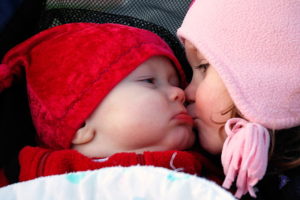Having a child is something wonderful, an incredible, unique experience and one of the best sensations a person can experience in their lifetime. Seeing that little human being in front of you awakens indescribable feelings, the desire to be with them all the time, to hold and kiss them. But did you know that giving a kiss to a newborn baby might not be a good idea?
As much as this act represents all the affection and love you feel for your child, it can result in consequences for them. Even though the baby’s intrauterine development is complete, the baby still needs to develop in several ways to adapt to the world outside the mother’s body1.
And who is part of this world? Yes, you! Many times, the mother herself, by kissing her baby, ends up exposing them to certain risks unintentionally. But even without meaning to, they are still risks, so it’s important you understand the potential harms that kissing a newborn can cause.
The Immune System of Babies
To think about how we can affect babies with a simple kiss, we need to understand how their immune system works. Their immunity is not fully developed as soon as they are born2.
Of course, there is an innate immunity from intrauterine development, but there is also the immunity that is acquired throughout life, either naturally or artificially through vaccinations.
We, as adults, are already accustomed to the vast majority of common daily bacteria, but what may go unnoticed by us can be very harmful to babies.
The Risks of Kissing a Newborn Baby
- Facial allergy in the baby
- Flu
- Herpes
Let’s talk in more detail about each of these conditions so you understand how they develop and what the best way to treat them is.
Allergy on the Baby’s Face
The most common facial allergy in babies is contact dermatitis, which is characterized by small bumps often on the cheeks, but they can also appear elsewhere on the face and on the neck3.
This happens because some people’s mouths may carry bacteria or small food or drink residues—bacteria that are harmless to adults but can trigger this allergic reaction in babies.
Flu
The flu is perhaps the most common illness and one we will catch many times throughout our lives, at least most of us. Because of this, babies are even more susceptible to catching the flu virus.
This virus manifests in different ways and some of them no longer affect us, but babies’ bodies have not learned to deal with them yet. The result is that kissing a newborn can give them the flu even if the person who kissed them isn’t sick.
Herpes
The herpes virus has no cure and, when it affects newborns, it can even be fatal. That’s why it’s so important to be careful with kisses. Although there is treatment, the disease can last for life, which can become a major complication.
Alternatives to Protect Your Baby
Now that you know all the risks that kissing a newborn brings, the big question is: How can I protect my baby? Fortunately, there are many ways—some more and some less effective—that help ensure that kissing your baby does not become a scary experience for you.
- Kiss the baby’s head
- Know who is in contact with your baby
- Keep Vaccinations Up to Date
- Keep Clean
- Household Items
Let’s talk a little more about each of these points to better explain how they can help protect your baby.
Kissing the Baby’s Head
The baby’s head is an area where bacteria are less likely to reach in harmful ways. In addition to not kissing the face or mouth, it is also not recommended to kiss the hands, since babies constantly put their hands in their mouths, which can transmit many bacteria to them.
Know Who Is in Contact with Your Baby
It’s very important when it comes to visitors to know who is in contact and who kissed your baby. You don’t need to be that person who objects to everything when others touch your child, but it’s important that you have control and make people understand the risks involved.
Keep Vaccinations Up to Date
An important way to keep your baby protected is by contributing to the development of their acquired immune system. Keeping vaccinations up to date is essential for your baby to stay protected and grow up healthy.
Keep Clean
Having washed and clean hands when in contact with your baby also helps prevent them from picking up any bacteria. This check should be done with anyone who touches the baby and, although it’s not possible to have absolute control, you can still enforce this rule strictly.
Household Items
Ensuring all of the baby’s household items are properly cleaned—and making sure they aren’t being shared with anyone else—is also very important to prevent unnecessary illnesses.
The urge to shower your baby with kisses is always strong, of course. It’s impossible not to feel this way when you see any baby, let alone your own child. But the point is, all that love should be expressed in other ways, at least in the baby’s first months until they are more protected and kissing does not represent such a risk anymore.
This doesn’t mean that you should never kiss your baby, but rather that you should be aware and careful when you do. Being properly clean and not showing any disease symptoms, even mild ones, is important for your baby’s safety. By taking these precautions and knowing who your baby is in contact with, you can fulfill your desire to kiss your baby as much as you want.
See also: What is Oral Thrush?
Photo: Fujifilm X-T10












